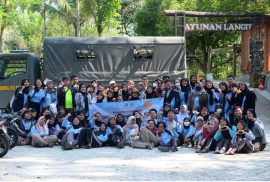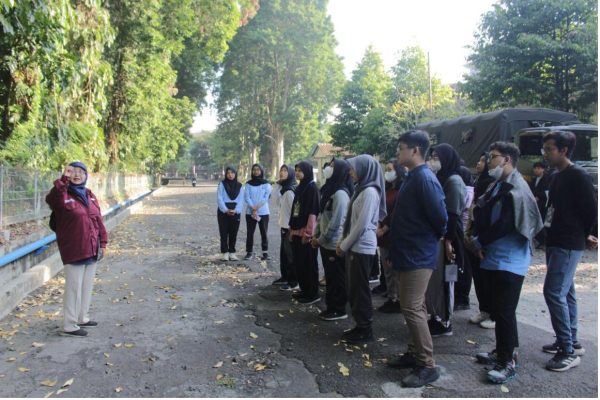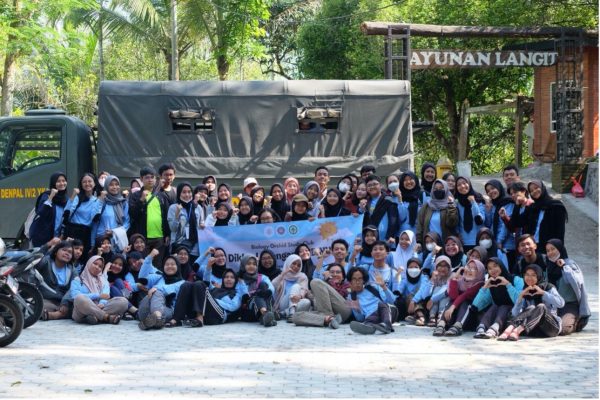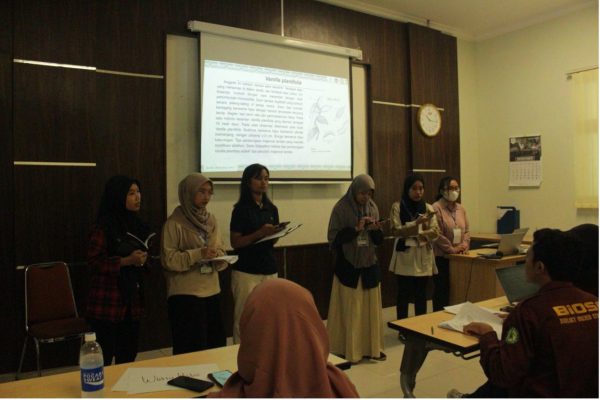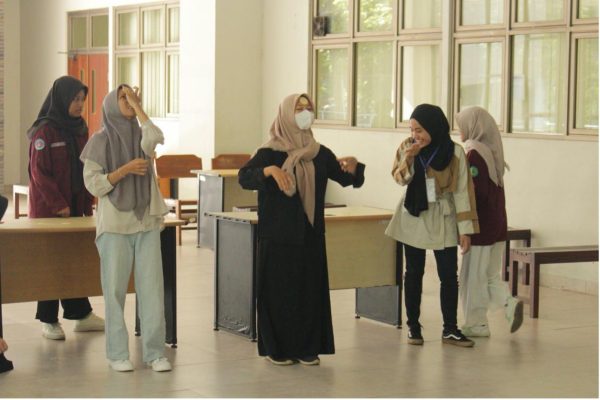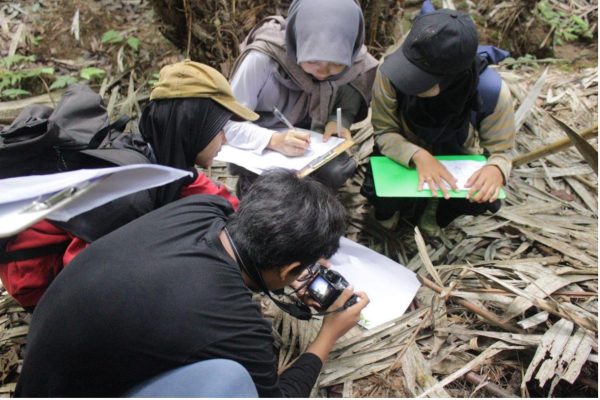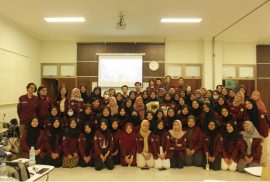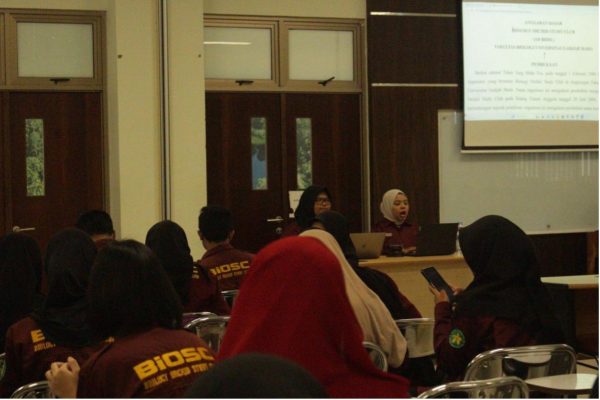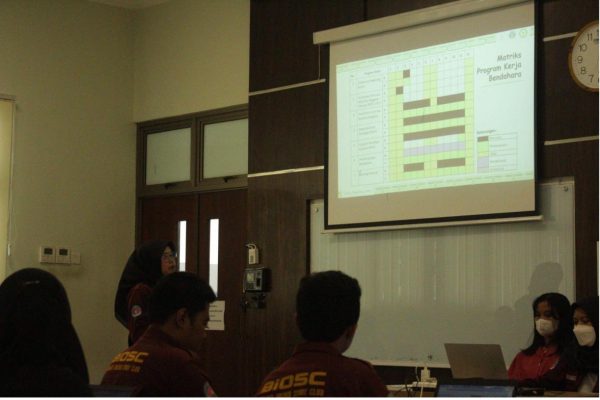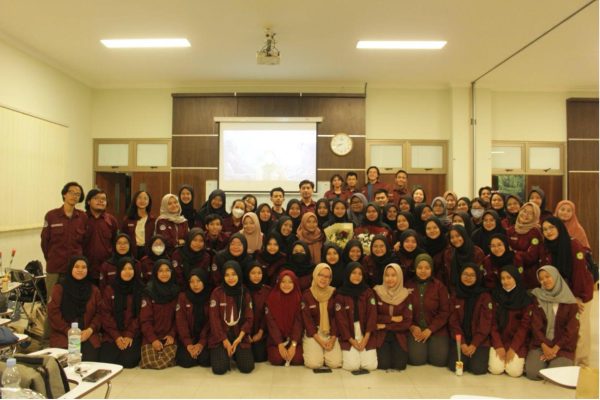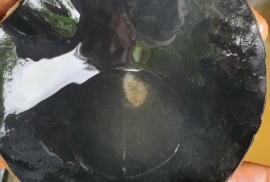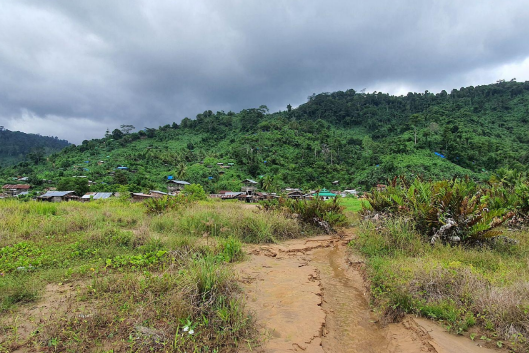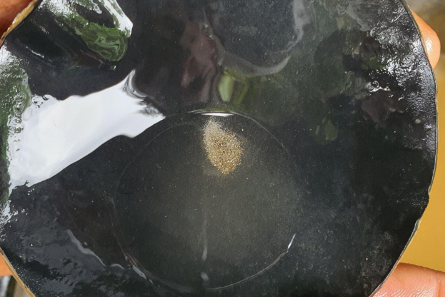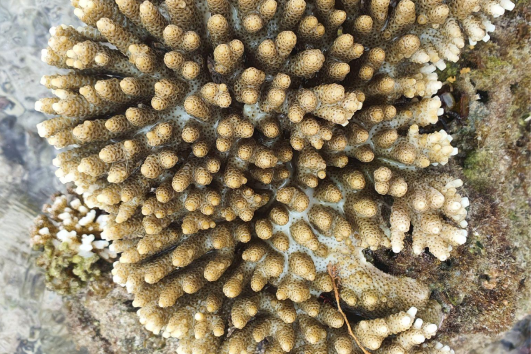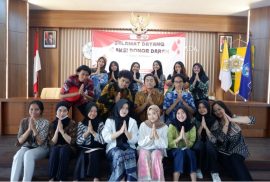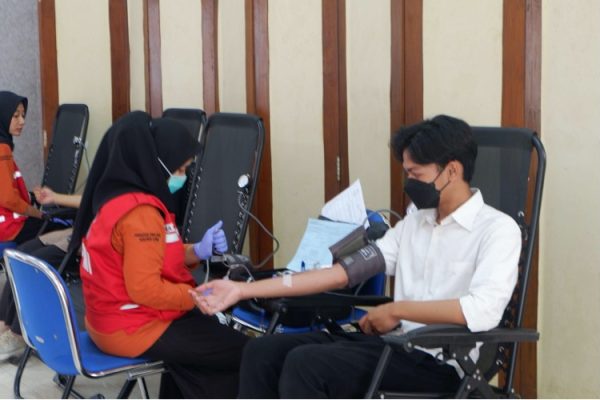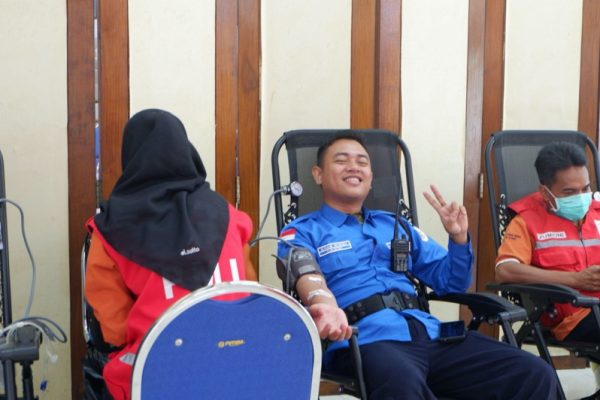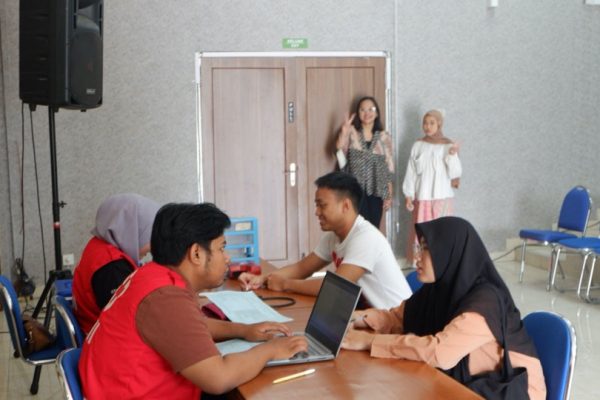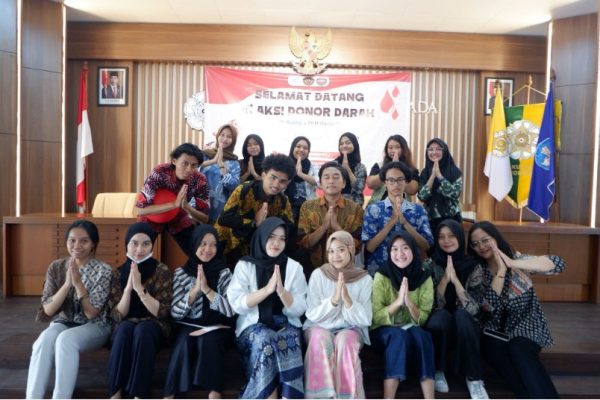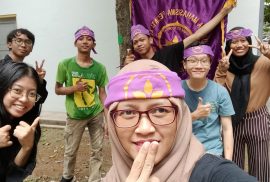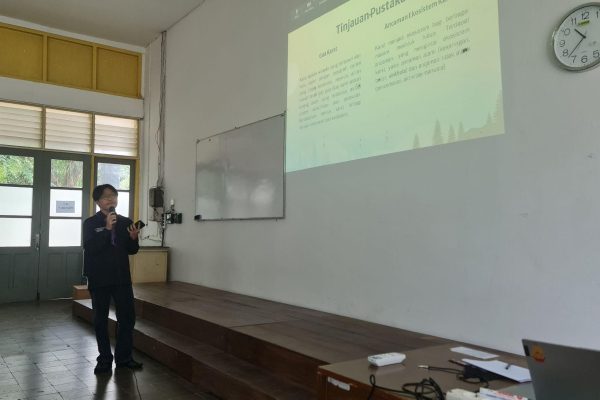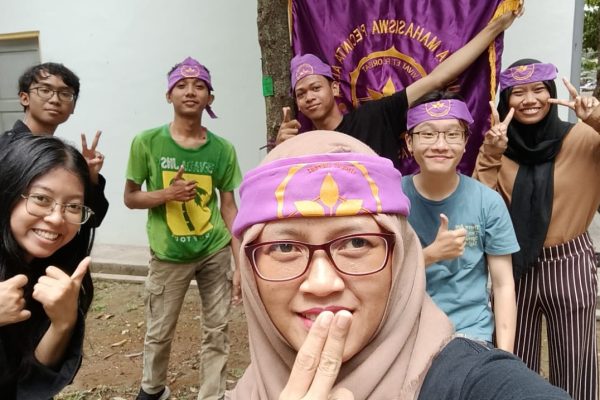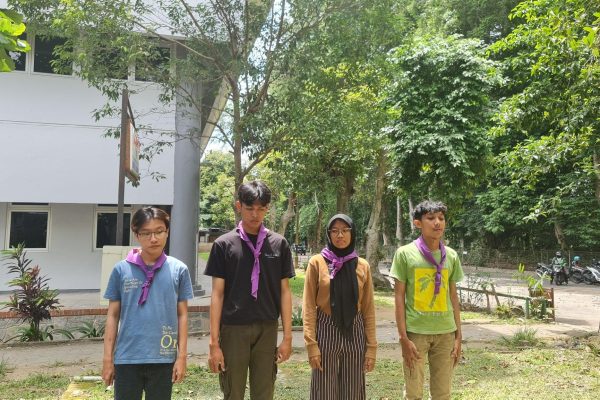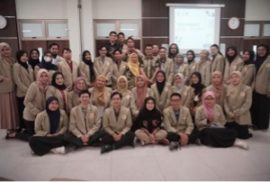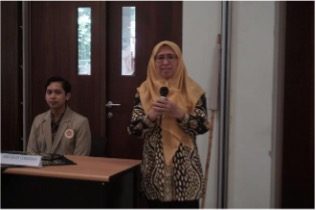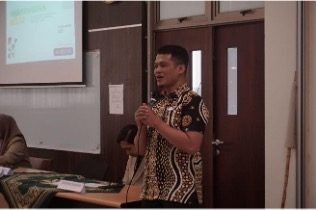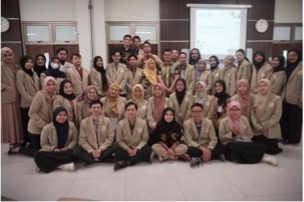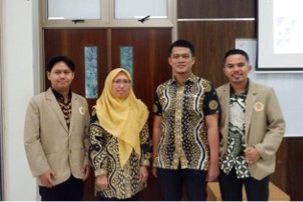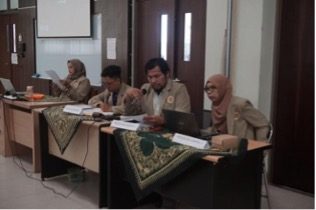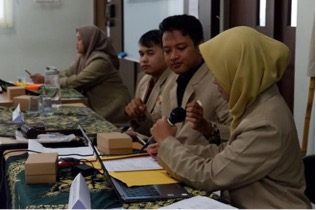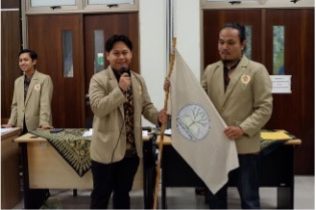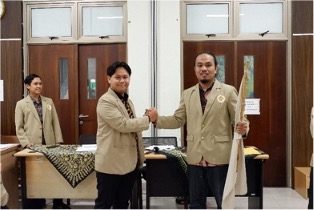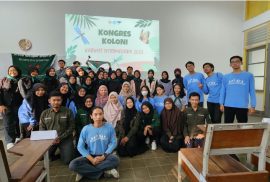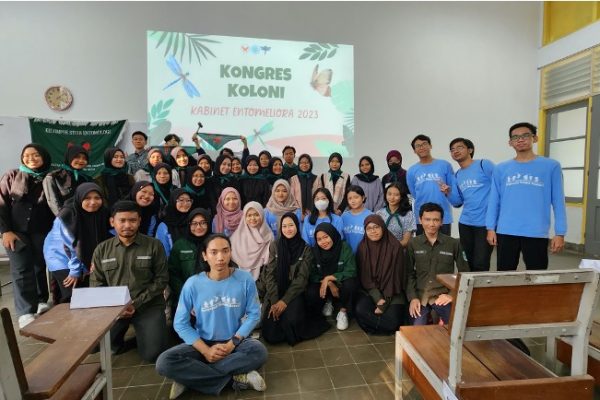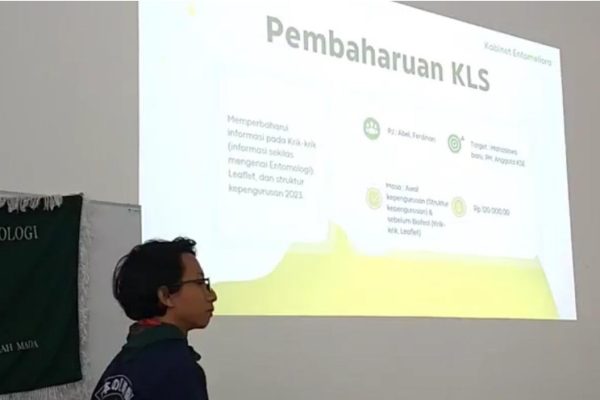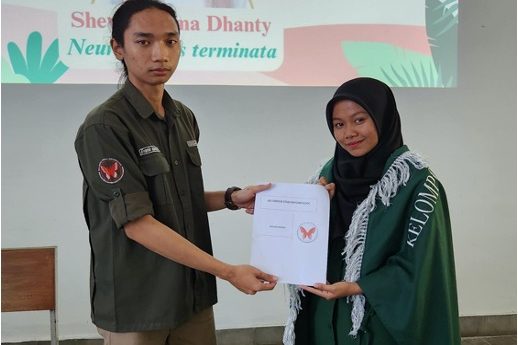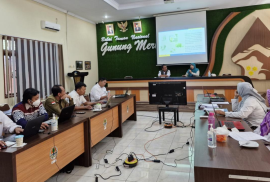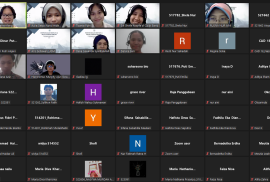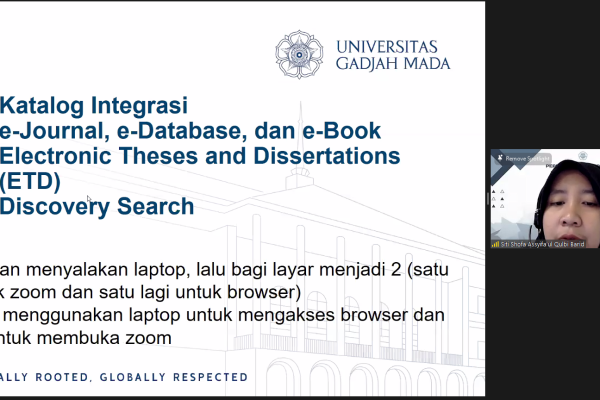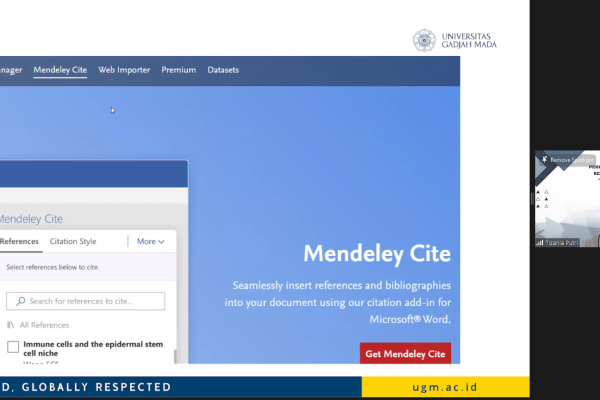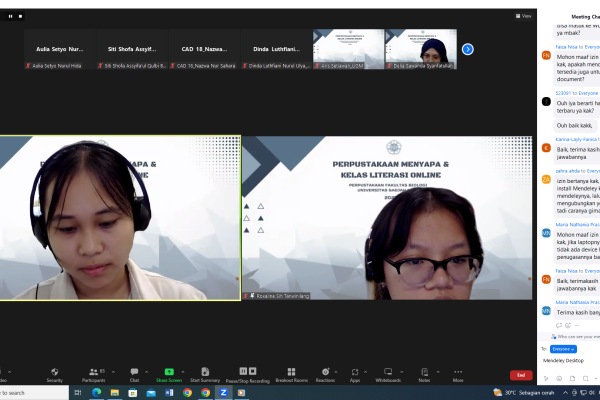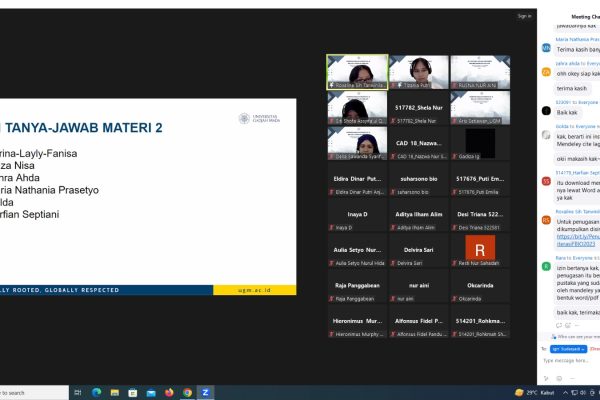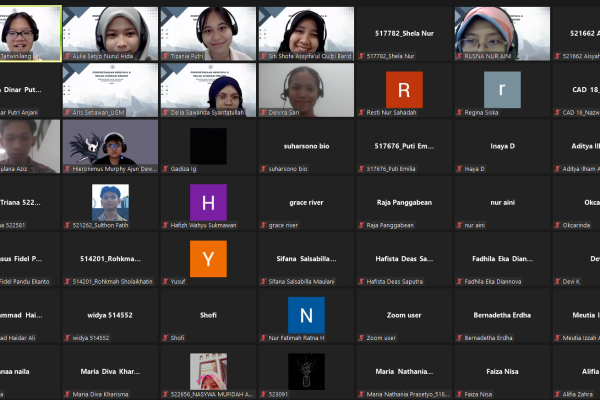Field Training is a continuation of the CAD XVIII’s (prospective new member) series of Basic Training (Diksar) aimed at supporting BiOSC’s role as a study group pioneering and driving orchid conservation efforts. This activity focuses on presenting orchid exploration findings in the natural habitat as a crucial part of CAD preparation. Through this exploration practice, participants not only acquire survival skills but are also encouraged to analyze field-acquired data. Throughout the program, participants undergo basic knowledge training to support their roles in Research training, Cultivation training, and Conservation training. Therefore, this field training (diklap) not only provides direct field experience but also prepares prospective members to apply and develop their understanding within the context of natural conservation. The field training took place at Ayunan Langit and the Faculty of Biology, UGM, involving 17 participants.
The Field Training commenced with an orchid exploration activity on December 20, 2023, at Ayunan Langit, Sabrangkidul, Purwosari, Kec. Girimulyo, Kabupaten Kulon Progo, Yogyakarta. It began with addresses from the Field Training committee chairperson, Wahyu Rinastomo, BiOSC chairperson, Lisna Nur Aini, and BiOSC Supervisor, Prof. Dr. Endang Semiarti, M.S., M.Sc., held at the Biology Garden Road (Jatabi), Faculty of Biology UGM, prior to departure for the exploration site. Upon arrival, the activity continued with an address by the Ayunan Langit’s management. The orchid exploration was conducted by dividing participants into 3 groups, with two exploration routes: route 1 and route 2. Each route comprised 3 stations, including station 1 for impressions, station 2 for resting, and station 3 for sketch checking. After completing the exploration activities, participants, organizers, and Ayunan Langit staff conducted documentation before returning to the Faculty of Biology, UGM. Upon arrival at the faculty, group discussions were held with their respective guides in preparation for presentations on the following day, the second day of the program.
The Field Training continued on December 21, 2023, in Rooms 2 and 3 of Building B at the Faculty of Biology, UGM. It began with mini-games held in the North Terrace of Building B, fostering camaraderie among CAD XVIII members, followed by presentations of the orchid exploration findings from December 20, 2023. These presentations included information on orchid identification results, orchid documentation, and sketch creation. Each group had a 15-minute presentation in front of the panelists, comprising BiOSC’s Senior Council, followed by a Q&A session. The expected outcome of this activity is for the CAD XVIII to apply and impart the knowledge gained during the Research training, Cultivation training, and Conservation training. The event proceeded with the inauguration of the CAD XVIII as the official AD XVIII by the BiOSC Chairperson for the 2023 period. Congratulations to the AD XVIII members who have been inaugurated. Wishing you a dynamic journey within BiOSC!
The Year-end Evaluation and BiOSC Member Meeting was held on Sunday- Monday, December 17-18, 2023, at Rooms 1 & 2 of Building B, Faculty of Biology, UGM. In this evaluation, the Cabinet of Paphiopedilum javanicum and BiOSC members collectively assessed the effectiveness of policies, programs, and initiatives implemented in 2023. The member meeting served as a platform for every individual in BiOSC to deliver, share thoughts, and contribute their ideas for the upcoming leadership. The event was attended by the Advisory Board (DP), Senior Council, active members, and Candidate of AD 18. On the first day, the event commenced with an opening by the MCs (Dwi Ayu and Pradhika Cikal), followed by speeches from the committee chairperson (Kholish Naufal Pamungkas) and the BiOSC chairperson. Subsequently, the activities proceeded with a review of the AD/ART (Constitution and Bylaws) for the new committee, led by the session leader, followed by the presentation of the Accountability Report (LPJ) by the Daily Board of BiOSC, consisting of the Chairperson and each division, which was followed by a Q&A session.
On Monday, December 18, 2023, the event continued with an assessment of the Daily Board, incorporating criteria such as work program implementation, internal relations, leadership, innovation and creativity, and synergy. This session was led by the Advisory Board (Andrea Maharani and Halimatur Rosyida). The evaluation outcome served not only as a performance benchmark but also as a basis for constructive feedback. Discussions regarding the Accountability Report yielded scores for each Daily Board member, and the acceptance of this accountability report was conditioned upon the Paphiopedilum javanicum Daily Board accompanying until CAD XVIII was inaugurated. Following this, the election for the BiOSC chairperson for the 2024 period. The candidates for the 2024 BiOSC chairperson were Anida Safriyani, Bella Marcha, and Haris Dwi Nugroho from AD XVI. Each candidate presented their vision, mission and work plan, engaging in discussions with the Daily Board and forum members. After deliberation by the forum, Bella Marcha was elected as the BiOSC Chairperson for the 2024 period. The handover of the BiOSC chairperson position occurred from Lisna Nur Aini (BiOSC Chairperson 2023) to Bella Marcha (BiOSC Chairperson 2024). Additionally, the handover of the Coordinator of the Senior Council was conducted from Ivory Martha Pertiwi (Coordinator SC 2023) to Kanya Nabila Febrirani (Coordinator SC 2024). Furthermore, five Advisory Board members for BiOSC 2024 were selected: Anandita Amalia Dewi, Prananda Imammuddin Dzaki, Nailah Aufa Khansa, Novi Astuti Indra Paranita, and Lisna Nur Aini.
The event concluded with a documentation session with all attending BiOSC members. We extend our gratitude and congratulations to the Daily Board of the Paphiopedilum javanicum Cabinet for fulfilling their responsibilities throughout one tenure in BiOSC. Congratulations are also extended to the BiOSC Chairperson, Coordinator of the Senior Council, and the elected Advisory Board for the 2024 period. The trust in choosing capable leaders is unwavering. BiOSC! Thrive, Grow, Sustain.
North Maluku is one of the regions in Indonesia with quite high gold-mining potential. Several small-scale gold mines (ASGM) are spread across several islands in the province, one of which is Obi Island. The gold mining process that involves mercury via the amalgamation of gold ore makes the area polluted by mercury emissions from the water to the soil. Through these problems, the Laboratory of Ecology and Conservation’s lecturer, Siti Nurleily Marliana, S.Si., M.Sc., Ph.D., together with a research team from the Microbiology Research Center and the Ecology and Ethnobiology Research Center of the National Research and Innovation Agency (BRIN), SEAMEO-BIOTROP, Hasanuddin University, Hein Namatemo University, and the Forest Plant Seed Center of the Ministry of Environment and Forestry, carried out research focused on restoring environmental damage and reducing the impact of mercury contamination through rhizoremediation technology from September 16 to 29, 2023.
ASGM is the second-largest source of mercury contamination in the world after fossil fuels. This pollution contributes to a long-term decline in water and soil quality in the form of neurological damage, including decreased body coordination, the ability to speak, and even birth defects. In line with the Sustainable Development Goals (SDGs), restoring this pollution is an urgency not only in conserving land and water ecosystems (SDG 14 and 15) but also in improving the quality of life and health of local communities (SDG 3).
Leily and the research team used a bioremediative approach by highlighting the potential of the microbiome in suppressing high metal contamination while being environmentally friendly, efficient, and cheap, utilizing abscular mycorrhizal fungi, which can increase plant resistance and absorption of heavy metal contamination. The combination of phytoremediation and rhizoremediation is possible to reduce mercury contamination more quickly in ASGM areas.
Another impact of gold mining also reaches marine ecosystem with increased ocean acidification. This certainly threatens the ecosystem and lives of local communities from a health to socio-economic perspective. The economic disparities seen in the island area also have an impact on the community’s ability to mitigate the impacts of environmental damage and change. Environmental problems, health and community welfare must of course be given special attention.
During the research trip, Leily also revealed the limited access to Obi Island. The long route and limited transportation have an impact on researchers’ challenges in bringing samples from the island, making it a challenge in the ongoing research process. With those challenges, the research, which is planned to take place in several stages, is expected to provide a solution to the complex problem of pollution in Obi as well as benefit the local communities affected.
Author: Anysa
Written based on research report “Back in the Office, with Some Good Omens: Recounting on Seeking the Eureka for Mercury Contamination in Obi” by Siti Nurleily Marliana, Ph.D.
On Saturday, November 11, 2023, the Social Department of the Biology Student Executive Board (BEM) UGM collaborated with the Social Department of the Geography Student Executive Board (BEM) UGM organized a Social Activity in the form of a Blood Donation event. The Social Activity is one of the work programs of the Social Department of the Biology Student Executive Board at UGM, involving positive activities that can benefit both the community within and outside the Biology Student Family (KMFB), and one of them is the Blood Donation program.
The Blood Donation 2023 took the theme “You Live Because You Give,” which signifies that one continues their life by sharing and realizing that humans are inherently social beings who need each other. By participating in Blood Donation, individuals have implemented the concept of mutual need and giving back. This Blood Donation initiative collaborates with PMI Sleman. Participation is open to all students of Universitas Gadjah Mada and the general public. Registration for Blood Donors was conducted by filling out the provided Google Form by the committee.
The Blood Donation 2023 was divided into three sessions: Session 1 starts from 8:00 AM to 9:00 AM, followed by Session 2 from 9:00 AM to 10:00 AM, and the final session from 11:00 AM to 12:00 PM. This session division aimed to avoid crowds and maintain a conducive environment. Participants were directed to register and complete a health form upon arrival. Subsequently, participants undergo health screening and blood type determination. If they meet the criteria, participants proceed to the blood donation area. After the blood extraction process, participants receive refreshments from the committee and PMI, along with merchandise as souvenirs. Participants who don’t meet the criteria are directed to collect merchandise from the committee. After receiving the merchandise, participants were guided to a photo booth for group photos.Blood Donation aims to serve the community by donating blood to those in need. The Blood Donation 2023 event successfully collected 25 bags of blood from 70 registered participants. Through this activity, the goal is to inspire kindness, encourage others to do good, and assist those in need.
The Senior Consolidation Training is a program for the advancement of Junior Members of MATALABIOGAMA to become Senior Members, individuals considered capable of guiding Junior Members in field activities due to their expertise, skills, and deeper understanding of environmental science and data collection in nature. In 2023, the Senior Consolidation Training of MATALABIOGAMA was conducted through the creation of mini-research projects focusing on mountains, forests, and caves. This initiative began with orientation sessions in July 2023 and concluded with the presentation of final reports in December 2023.
The orientation for the Senior Consolidation Training took place on July 9, 2023, conducted online through Zoom meeting. It was followed by the development of the proposal until August 5, 2023. After the proposal submissions, a research concept presentation occurred on August 6, 2023, for review by the existing Senior Members. Data collection commenced upon approval of the proposals and continued until November 2023, guided by capable Senior Members during the orientation period. The final report generated from the collected data was submitted and presented on December 17, 2023, witnessed by Senior Members and alumni.
From the Senior Consolidation Training of MATALABIOGAMA 2023, four Junior Members were successfully promoted to Senior Members. These members include Tan Rendy, Hanan Zharifah Zahra, Nur Baehaki Romadhon, and Achmad Naufal Yogastrio. With the appointment of these four members as Senior Members of MATALABIOGAMA, it is hoped that they will steer the organization toward greater success. Vivat et Floreat!
The 12th General Assembly of the Postgraduate Student Family of the Faculty of Biology Universitas Gadjah Mada was held on Tuesday, December 19, 2023. The event was chaired by Safril, S.Si., with the theme “Fostering Consistent Organizational Spirit in Developing a Collaborative and Communicative Biology Postgraduate Student Family.” The event was conducted in a hybrid format, taking place in Lecture Rooms 1 and 2 of the Sinarmas Building, Faculty of Biology, UGM, and through the Zoom Meeting platform. The opening session was attended by supervisor of the Postgraduate Student Family, Dr. rer. Nat Andhika Puspito Nugroho, S.Si., M.Sc. also as the Head of the Master in Biology Study Program and, and Prof. Dr. Endah Retnaningrum, M.Eng also as the Head of the Doctor in Biology Study Program. Additionally, the General Assembly of the Postgraduate Student Family (KMP) was also attended by the KMP resigning executive board , the KMP committee for the 2022/2023 period, as well as student representatives from the 2021-2023 period who were present both physically and virtually.
The event was opened by Emi Suhaemi,S.Si. at 08:00 AM WIB. It commenced with the singing of the Indonesian national anthem, the Universitas Gadjah Mada hymn, and the Biology March accompanied with the VOB (Voice of Biology). The event continued with speeches from the organizing chairperson, Safril, S.Si., who expressed gratitude to those who supported the realization of the 12th General Assembly of the Postgraduate Student Family. Subsequently, Yusril Ihza Farhan Wijaya, S.Si., the Chairperson of the 2022/2023 KMP period, conveyed appreciation and gratitude to all KMP committees for their contributions to activities that enriched knowledge, community service, and fostered personal development. He also encouraged an evaluation of past activities for future improvements. Next, the KMP Supervisor, Dr. rer. nat Andhika Puspito Nugroho, S.Si., M.Sc., expressed full appreciation for the KMP’s work program. Particularly, he highly praised the Voice of Biology’s involvement in the International Conference of Biological Science (ICBS). He also advised the upcoming committee to maintain the ongoing programs optimally. The event was officially opened by Prof. Dr. Endah Retnaningrum, M.Eng., who emphasized the importance of innovation without disregarding established practices. The opening of the 12th General Assembly of the Postgraduate Student Family concluded with a prayer led by Rashif Naufal Andika, S.Si., and a group photo. The subsequent activities of the 12th General Assembly of the Postgraduate Student Family included Plenary Sessions I through V.
The Plenary Session I discussed the regulations to be used during the General Assembly and the election of the Permanent Session Presidium. The outcome of Plenary Session I determined that Susanti, S.Pd., Zakaria, S.Pd., and Syeprianto Permana, S.Si, were elected as the Permanent Session Presidium. Plenary Session II focused on the accountability report of the KMP committee for the 2022/2023 period. The report was presented by the KMP chairman and each division within the 2022/2023 KMP committee. Plenary Session III deliberated on the article of association (AD), Bylaws (ART), Organizational Guidelines (GBHO), and Recommendations. Discussions revolved around modifying aspects deemed necessary for revision, in line with developments, through mutual agreement within the forum. Plenary Session IV dealt with regulations and the mechanism for selecting the KMP chairman for the 2023/2024 period. Revisions were made to the content or wording of the regulations and mechanisms considered irrelevant in determining the new KMP chairman. Plenary Session IV ratified Alexander Tage, S.Si., Wahyul Fatwatul Umam, S.Si., Rashif Naufal Andika, S.Si., and Puji Lestari, S.Pd, as candidates for the KMP Chairman for the 2023/2024 period. Plenary Session V involved the election of the KMP chairman for the 2023/2024 period. The selected candidates presented their vision and mission, engaging in discussions with the General Assembly audience. After deliberation by the forum, Wahyul Fatwatul Umam, S.Si., was confirmed as the KMP Chairman for the 2023/2024 period. The conclusion of the General Assembly was marked by the handover of duties from Yusril Ihza Farhan Wijaya, S.Si, the Chairman of the 2022/2023 KMP period, to Wahyul Fatwatul Umam, S.Si, the elected Chairman for the 2023/2024 period.
To appreciate all members of the Nata Abhipraya Cabinet, the resigning executive board organized the KMP Awards. The “Most Collaborative Division/Field” award was bestowed upon the Media and Information Division, the “Most Cooperative Division/Field” award went to the Attraction Division, the “Most Consistent Division/Field” award was given to the Student Welfare Unit (KWU), the “Most Creative Division/Field” award was presented to the Human Resources and Development Division (PSDM), the “Most Administrative-Compliant Division/Field” award was attributed to the Social and Community Division (Sosmas), and the “Most Financially Compliant Division/Field” award was granted to the Finance and Asset Division (Kastrak). Additionally, there were awards for the Best Division Chair, won by Wildan Alfian Fahmi, S.Si. (PSDM), the Best Secretary, achieved by Salsabiela Praha Karima Reza, S.Pd. (Sosmas), and the Best Treasurer, earned by Windy Arensya Omadhika, S.Si. (Kastrak). Lastly, the “Most Active Staff in the Odd Semester 2022” award was given to Tamalia, S. Pd., the “Most Active Staff in the Even Semester 2022” award was bestowed upon Thesia Megi Kurniawati Rettob, S.Si.., and the “Best Intern Staff” award for the most active internship period was presented to Emi Suhaemi, S.Si. With the conclusion of the KMP Awards, the entire series of events for the 12th General Assembly of the Postgraduate Student Family at Universitas Gadjah Mada(UGM) is declared finished.
The Colony Congress, commonly known as ‘KOKON,’ is an annual assembly regularly conducted by the Entomology Study Group (KSE) of the Faculty of Biology UGM. The purpose of KOKON is to collectively evaluate the performance of each cabinet division during a term of period and elect a new cabinet chairman. This year, KOKON was successfully held on December 18-19, 2023, at Room IV B of the Faculty of Biology UGM and was attended by all active members of KSE, both in person and semi-virtually.
On Monday, December 18, 2023, the event commenced at 08:30 AM WIB and was hosted by Ziyan Fareysa Abharani (KSE XXV) and Muhammad Fathin Setya Daffa (KSE XXIV). The program began with speeches from the KSE Supervisor, Drs. Hari Purwanto, M.P., Ph.D., and the 2023 KSE Chairperson, Cornelius Devito Deva Pramana Atmaja (KSE XXII). The presentation of the Accountability Report (LPJ) to the members’ forum was conducted by the Daily Board of KSE Entomeliora Cabinet, followed by discussions by the Organizational Advisory Council (DPO) to evaluate, assess, and consider the acceptance of the LPJ.The event continued with a congress meeting regarding KOKON’s Rules of Procedure, led by three interim Session Leaders: Chandra Rifana Arifin (KSE XXIV), Faizatun Nisa (KSE XXV), and Puti Emilia (KSE XXV). The session proceeded with deliberations on the Articles of Association and Bylaws (AD/ART) by the permanent Session Leaders: Hafista Deas (KSE XXV), Faizatun Nisa (KSE XXV), and Puti Emilia (KSE XXV).
On Tuesday, December 19, 2023, at 08:30 AM the discussion session regarding the Bylaws (ART) continued with the previous permanent Session Leaders. After approval, the KOKON event sequence moved forward with the election of the 2024 KSE chairman between the candidates Sheva Rimma Dhanty (KSE XXIII) and Regina Nilamsari (KSE XXIV). Both candidates presented their visions and missions for their tenure and engaged in a Q&A session with the forum. After deliberation by the forum, Sheva Rimma Dhanty (KSE XXIII) was confirmed as the 2024 KSE Chairman. Following the handover of responsibilities from the 2023 KSE Chairman, Cornelius Devito Deva Pramana Atmaja (KSE XXII), to the newly elected chairman, Sheva Rimma Dhanty (KSE XXIII), the proceedings continued with discussions for selecting the Organizational Advisory Council (DPO). The entire sequence of the 2023 Colony Congress concluded with a documentation session.
As part of the implementation of the collaboration agreement between the Faculty of Biology UGM and the Mount Merbabu National Park , one of the activities carried out in 2023 was the bioprospecting of medicinal plants. One of the selected species for potential study was Centella asiatica (L.) Urb., known locally as ‘pegagan.’ This plant is a perennial herb that thrives in various habitats and is commonly found in the Mount Merbabu area. This year, the bioprospecting activities commenced with research on the secondary metabolite profile, particularly focusing on the terpene and terpenoid groups. This research served as an initial step to determine the subsequent stages in the utilization of pegagan, especially as a medicinal plant recognized by the local community for its wound-healing properties. The bioprospecting research contributes to the achievement of the Sustainable Development Goals, particularly Goal 3: Good Health and Well-being.
The Faculty of Biology UGM team involved in these activities was led by Prof. Dr. Ratna Susandarini, M.Sc., who presented the preliminary findings of the pegagan bioprospecting research on Thursday, December 21, 2023. The event, held at the Mount Merbabu National Park Office, was led by the Acting Head of the office, Dr. Nurpana Sulaksono, S.Hut., M.T., with collaboration coordinator Kristina Dewi, S.Si., M.Eng., M.Sc., and all the staff of the Ecosystem Forest Controllers. During the event, the compounds belonging to the terpenoid group, successfully identified using GC-MS methods, were presented. Discussions on the follow-up of the plant bioprospecting program resulted in an agreement to conduct further research next year to delve deeper into the potential and prospects of pegagan products.
The Faculty of Biology UGM team involved in these activities was led by Prof. Dr. Ratna Susandarini, M.Sc., who presented the preliminary findings of the pegagan bioprospecting research on Thursday, December 21, 2023. The event, held at the Mount Merbabu National Park Office, was led by the Acting Head of the office, Dr. Nurpana Sulaksono, S.Hut., M.T., with collaboration coordinator Kristina Dewi, S.Si., M.Eng., M.Sc., and all the staff of the Ecosystem Forest Controllers. During the event, the compounds belonging to the terpenoid group, successfully identified using GC-MS methods, were presented. Discussions on the follow-up of the plant bioprospecting program resulted in an agreement to conduct further research next year to delve deeper into the potential and prospects of pegagan products.

As part of the implementation of cooperation agreement between the Faculty of Biology UGM and the Office of Mount Merbabu National Park, one of the activities carried out in 2023 is bioprospecting of medicinal plants. One of the species with potential health benefit is Centella asiatica (L.) Urb. or Asiatic pennywort. This species is a perennial herb that can grow in various types of habitat, and is found abundantly in some areas of Mount Merbabu. The bioprospecting study of this species conducted in this year began with preliminary research to generate secondary metabolite profiles, especially organic compounds from terpene and terpenoid groups. This research is the first step to determine the next stage in the exploration of potential use of Asiactic pennywort as medicinal plant which is known by the local community as traditional medicine for healing wounds. This bioprospecting research contributes to achieving the Sustainable Development Goals, especially the third goal, namely Good Health and Well-being. The team from Faculty of Biology UGM involved in this activity was coordinated by Prof. Dr. Ratna Susandarini, M.Sc, who presented the results of initial research on Asiatic pennywort bioprospecting on Thursday, 21 December 2023. This presentation and discussion was led by the acting Head of the Office of Mount Merbabu National Park, Dr. Nurpana Sulaksono, S.Hut., M.T., the coordinator for cooperation affairs Kristina Dewi, S.Si., M.Eng., M.Sc., and all staff of Pengendali Ekosistem Hutan. In this occasion, the result preliminary analysis which shows the content of terpenoid compounds identified using the GC-MS method were explained. Discussions regarding the follow-up to the plant bio-prospecting program resulted in an agreement that further research to reveal in more detail the potential and prospects of Asicatic pennywort products will be carried out next year.

Presentation and discussion of the results of plant bio-prospecting at the Mount Merbabu National Park Office
On Saturday, December 16, 2023, the Faculty of Biology Library, along with the volunteer team, organized an event called “Library Welcomes and Online Literacy Class” to welcome the new students of the 2023 Bachelor’s Program in the Faculty of Biology. The event was conducted online from 08:00 to 14:30, with the discussion session ending at 11:00 and followed by an assignment session with a submission deadline at 14:30. This activity included training on Bio-Digilib Application Introduction, accessing e-resources, and Mendeley citation management. The event commenced with an opening by Roxaline Sih Tanwinilang and continued with a welcoming address by the Faculty of Biology Librarian, Mrs. Rusna Nur Aini. Mrs. She hopes that the 2023 students will possess publication skills and digital literacy that will be beneficial in supporting them throughout their studies and future careers.
The activity was divided into two sessions. The first session was conducted by the library volunteer team, Siti Shofa Assyifa’ul Qulbi Barid, introducing the Faculty of Biology UGM Library Unit under the supervision of Drs. Ign. Sudaryadi, M.Kes. located on the 3rd floor of Building B in the Faculty of Biology, provides both offline and online services. Among the facilities offered are circulation rooms, an ETD (Electronic Theses and Dissertations) room, computer labs, lockers, and more. The Biology Library’s program activities encompass various initiatives such as talk shows, book discussions, open recruitment for new volunteers, literacy guidance, library volunteer training, and participation in community service programs. The subsequent part of the session focused on accessing e-resources, providing guidelines for accessing e-journals, e-book databases, available through the lib.ugm.ac.id website. Additionally, an explanation was given about an integrated catalog allowing users to view collections from all UGM libraries. Databases on lib.ugm.ac.id, such as ScienceDirect and Springerlink, can be accessed in full using UGM email accounts. Moreover, the Electronic Theses and Dissertations (ETD) can be directly accessed from both the Main Library and the Faculty of Biology Library. The ETD contains comprehensive research data and final projects from all UGM students.
The second session provided a guide on the installation and use of Mendeley led by Tizania Putri Langithari. Mendeley facilitates easier citation creation and bibliography compiling, offering features for note-taking and document annotations. The first step involves creating a Mendeley account, followed by downloading it through the provided link and signing in with the created account. Integrating Mendeley into Word is achieved by navigating to the “insert get add-ins” section, where the Mendeley cite option will appear. Within Mendeley, citation styles can be adjusted according to individual needs. Upon concluding the discussion, participants were given assignments based on the presented material. Participants were enthusiastic in responding and asking questions. Attendance required submission of assignments, aiming to assess the depth of understanding among the participants in the literacy class. The hope is that this activity will facilitate students’ access to available literacy resources in the library. Warm regards from the Biology Library, promoting literacy!

